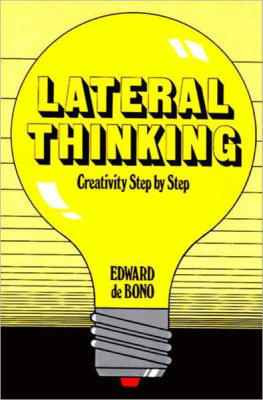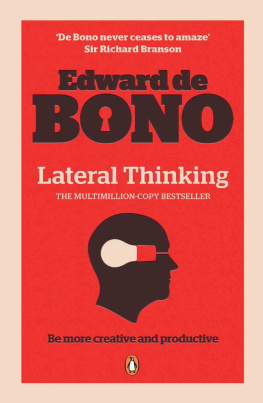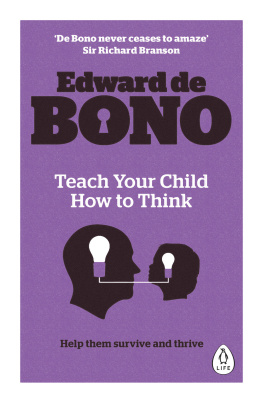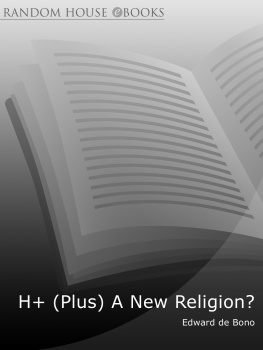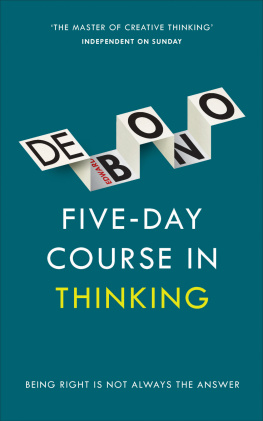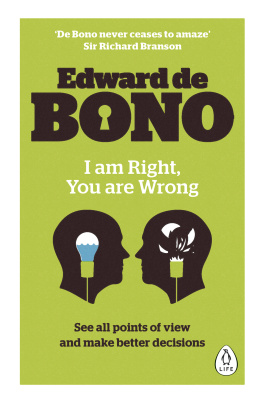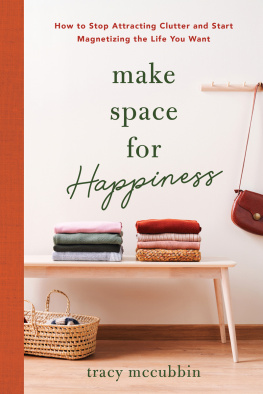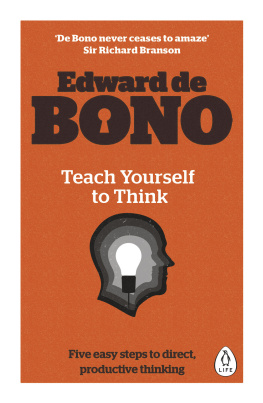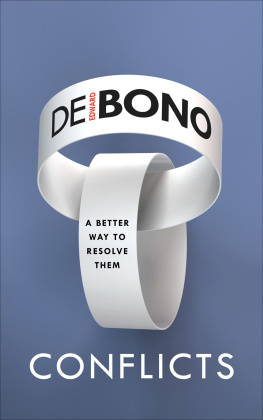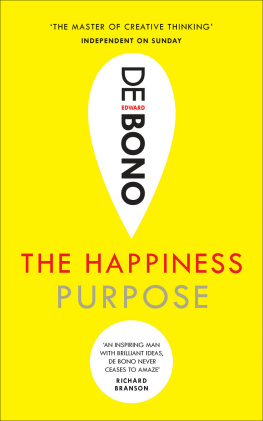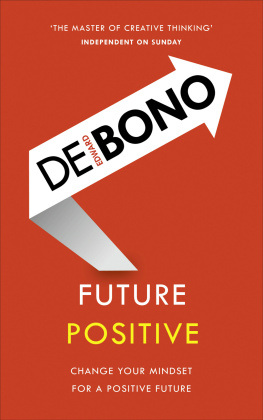CONTENTS
About the Author
Edward de Bono studied at Christ Church, Oxford (as a Rhodes Scholar). He also holds a PhD from Cambridge and an MD from the University of Malta. He has held appointments at the universities of Oxford, London, Cambridge and Harvard.
In 1967 de Bono invented the now commonly used term lateral thinking and, for many thousands, indeed millions, of people worldwide, his name has since become a symbol of creativity and new thinking. He has written numerous books, which have been translated into 34 languages, and his advice is sought by Nobel laureates and world leaders alike.
About the Book
Just as burning is the proper function of fire, so happiness is the proper function of our existence.
First published in 1977, in this extraordinarily prescient book Edward de Bono sets out his method for achieving the ultimate 21st-century goal: work-life balance.
De Bono invites the reader to look at their life and measure the gap between their self-space and their life-space the smaller the gap, the greater our chances at happiness; but if the life-space is vastly bigger than the self-space, our coping ability is compromised and anxiety is likely.
For anyone concerned with happiness and life-fulfilment this book is essential reading, and is perhaps more resonant with readers now than ever before.
Other Titles by Vermilion
The Six Value Medals
How to have a Beautiful Mind
How to have Creative Ideas
Think!
Six Frames
Serious Creativity
Lateral Thinking
The Mechanism of Mind
H + (Plus) A New Religion?
Parallel Thinking
Five-Day Course in Thinking
THE HAPPINESS PURPOSE
Edward de Bono
AUTHORS NOTE
The proposed religion is based on the belief that the legitimate purpose of life is happiness and the best foundation for happiness is self-importance.
The happiness purpose is to be achieved through the use of thinking and humour and dignity. The ideal of love is to be replaced by the more reliable practice of respect.
The new religion may be used as a framework or as a philosophy. It may be used as a way of living or a way of looking at things. The new religion may be used on its own or in conjunction with any other religion.
Unlike some others, the new religion focuses on the positive aspects of mans nature.
It may of course be that religion is the wrong word.
INTRODUCTION
The world may need a new religion simply because it intends to find one anyway
The old religions, including Marxism, were designed for a world of suffering. Buddhism sought to relieve the suffering by encouraging man to detach himself from his earthly self which was seen to be both the cause of the suffering and the sufferer. Christianity offered happiness in the next world and this salvation was to be gained by enduring the suffering in this one and using it to improve ones soul. Marxism suggested that man should look to the happiness of the state rather than his own and if the state seemed to require him to suffer then this was necessary for the happiness of the state. Today boredom has replaced suffering in the larger communities of the industrialized nations. Boredom includes confusion, lack of direction and a depression caused by the complexity of modern life. The relationship of the established religions to modern society will be discussed in the next section.
New religions are developing. They take two forms. Both forms are simple and direct but dangerous because they add nothing to the well-being of the world. The first form is the religion of opposition. Opposition has always been a most effective basis for a religion. Opposition offers a direction, a mission and a role. It offers self-importance and palpable achievement. It offers comradeship and organization. Above all it offers a definite value system against which to judge each action. The success of Christianity may have been due to the opposition that was forced upon it in the early days. The success of Judaism may have been due to the permanent opposition that has been its destiny. The success of Marxism is certainly due to its emphasis on the struggle against established capitalism. Indeed, so much emphasis was rightly placed on this opposition stage that little thought was given to what would be done if the opposition were too successful and removed what it opposed. There is always something to oppose, and those with a religious zeal can always find a cause to shape that zeal into a mission.
The second form of religion that is developing is that of self-abdication. Since the self is so boring and so much trouble it should be abandoned. This abandonment can itself take two forms. The first form is the handing over of the self to some outside power that is to run it for you. Let the stars run your self for you, or the party or your guru. The second form is that of ecstasy. Bypass the self and switch straight to the pure pleasure of ecstasy and mysticism. Drugs are an easy way of doing it and in time, perhaps, direct electronic stimulation of the brain.
Both the opposition and the self-abdication type of religion are anti-world insofar as they do not seek to make the world a better place or the individual a better individual. Many of the major religions had elements of both opposition and self-abdication. There was continual opposition to evil and especially to the earthly self with its greed and selfishness. There was also the element of self-abdication in mysticism, detachment and not me but Gods will through me.
Astrology requires no belief beyond the initial belief that the stars will run your life for you. Religions of opposition require no belief beyond the initial belief that there is a cause. Once these initial beliefs have been acquired then there is an outside reference system that gives point and enjoyment to life. This outside reference system reduces confusion and makes decision easy . Man has always sought such a reference system outside of himself. Without such an outside reference system decisions are appallingly difficult and complex. The only solution is drift and moment-to-moment opportunism. In fact, any system requires a system outside of itself to act as a reference framework. This framework is called a meta-system. The purpose of meta-systems is described in .

Figure 1
Religion has always provided man with his meta-systems. Is there likely to be a revival of the established religions? If so, it is likely to be of the zealous and charismatic variety which will inspire some and alienate others. In its evolutionary progress, is the trend of mans thinking and feeling likely to crystallize at some point into a new religion? It may do. But it may also be leading away from that point of departure, as shown in .
In this book is described a new religion that is not based on truth or on a belief in God and salvation. Love is discarded and replaced by something less wonderful but more workable. It is a low-key religion based on humour and good humour. Instead of denying the self it seeks to enhance the self and to emphasize self-importance . Because it does not rely on absolute truths it is possible to make a god of mans mind.


